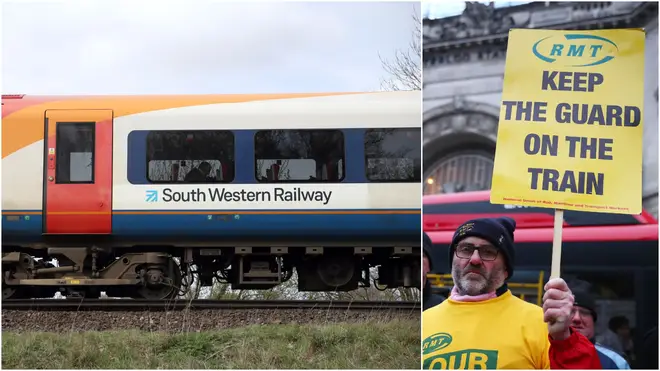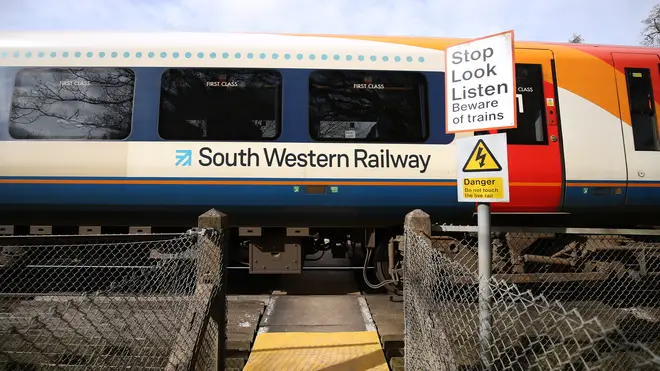
Nick Ferrari 7am - 10am
2 December 2019, 04:59

Strike action will hit thousands of passengers on Monday after South Western Railway (SWR) and the RMT union failed to reach a deal.
Hundreds of thousands of rail passengers will face a month of disruption across December due to a walkout on the railway as part of the long-running dispute over guards on trains.
Members of the Rail, Maritime and Transport (RMT) union on South Western Railway will walk out for 27 days from December 2 until New Year's Day - the longest stretch of action against a major rail operator in living memory.
Passengers have been warned only around half of the services will run, including those to and from London Waterloo, the country's busiest railway station.
While those travelling to and from places like Portsmouth, Reading and Southampton face nearly a month of disruption.
Services will be cancelled, replaced by buses or finish earlier than normal, while trains that do run are expected to be busier than normal.

Talks between the union and rail bosses fell apart last week with both blaming one another for failure to reach a deal.
RMT general secretary Mick Cash said: "RMT is angry and frustrated that a set of proposals that would have guaranteed the safety-critical role of the guard at the point of despatch, and which would have cost the company absolutely nothing, have been kicked back in our faces.
"There is no rational explanation for the company position and we can only assume that either they or their paymasters in Government want this strike action to go ahead for politically motivated purposes.
"The union also believes that cutting the guard out of the despatch process reduces the second person on the train to little more than a passenger in the longer term, which would give the company the option of axing them all together at some point down the line.
"Both the union and the travelling public are being set up - and that stinks."
He added: "Our action goes ahead from Monday in defence of passenger safety and accessibility, and the blame for that lies wholly with SWR and their wrecking strategy.
"The union remains available for talks and we have a deal to solve this dispute which is cost-free for SWR worked up and ready to go.
"The company should grab it with both hands and avoid the disruption to services their actions will unleash."
ℹ️ RMT strike starts tomorrow. Make sure you visit https://t.co/zEDcuibyoB to plan your journey as we will be running an amended timetable until the New Year. We know this will make traveling more difficult and we are working hard to keep you moving.
— SWR Help (@SW_Help) December 1, 2019
An SWR spokesman said: "We have done everything we can and more to meet the RMT's outdated demands with our promise of a guard on every train and a safety-critical role for that guard.
"What we are not prepared to compromise on is the much-needed modernisation of the service with improved performance, safety and customer service that our new fleet of modern suburban trains will vitally deliver for customers.
"We know our passengers will welcome over 10 million more passenger journeys a year arriving on time and this much-needed improvement to our service is too important to compromise."
He added: "Throughout negotiations, we have tried repeatedly to find ways to meet the RMT's aspirations.
"However, every time we find a way forward on one point the union has moved the goalposts by changing its position.
"They said at the outset this was about keeping the guard on the train, that is exactly what we have offered.
"They said they wanted a safety-critical role for that guard, that is what we have offered.
"Unfortunately, it is clear to us that the RMT is unclear on what this dispute is about and intent on striking no matter what.
"We know the impact these RMT strikes will have on our passengers and we want to be clear that we have done everything we can to try to avert the strikes and meet RMT's antiquated and changing demands."